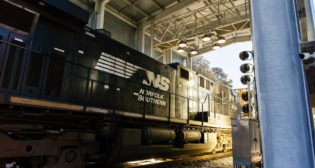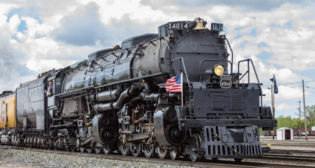
A tutorial for new STB members
Written by Frank N. Wilner, Capitol Hill Contributing Editor
Capitol Hill Contributing Editor Frank N. Wilner
Watching Washington, May 2018: Railroads, as do all for-profit undertakings, earn their crust by selling at a price-multiple above production costs. Otherwise, they become revenue inadequate, meaning they lose investors, cease renewing assets, hollow out service and fail.
Decades of smothering economic regulation stuffed railroads into such a trick bag until congressionally ordered partial economic deregulation in 1980 permitted them to chew their way out in pursuit of revenue adequacy.
The shipper-supported railroad renaissance has been, in a word, remarkable.
Since lifting of the regulator’s heavy hand, the rail industry’s rate of return on net investment (ROI) has climbed from 4% to more than 10%, with BNSF, CSX, Norfolk Southern and Union Pacific posting ROI that meets or exceeds the industry’s cost of capital (a measure of revenue adequacy). This financial recovery encouraged and allowed a 300% increase in new capital investment for service-enhancing asset renewal and expansion.
With the Surface Transportation Board (STB) poised this year to rule on several shipper proposals that could profoundly affect market-based ratemaking that directly impacts ROI and each railroad’s willingness and ability to renew infrastructure, we offer an ageless tutorial especially appropriate for new STB members.
It is a product of the late William J. Cunningham, once an official of the Boston & Maine Railroad and, from 1915 to 1946, the James J. Hill Professor of Transportation at Harvard University. Cunningham perennially recounted to his students the 1917 oral testimony of fellow New Englander William A. Graustein as delivered before STB predecessor Interstate Commerce Commission (ICC).
Professor Cunningham termed Mr. Graustein “a gentleman farmer and member of a family noted for brilliant scientific achievement.”
Following is Professor Cunningham’s recollection of Mr. Graustein’s protest of a proposed rate increase by the Boston & Maine Railroad for the movement of milk south to a Boston distributor.
Graustein: “There is no reason for this increase, as the Boston & Maine incurs no expense in moving my milk to Boston. You see, it is like this. I hitch up my horse to the wagon, load the cans of milk and drive down to the station. I get there at a quiet moment of the day. The agent who is on duty and not doing anything helps me unload the milk onto the platform. No cost there.
“Pretty soon, the train comes along. It is a regularly scheduled train that is running anyhow. It always carries a baggage car with a baggageman in charge. He doesn’t get any more money because of my cans of milk being on the train, and there is plenty of room in the baggage car.
“Well, the train stops, and the baggageman opens the door. The agent and I help him load the cans of milk into the car. The train then runs along to Boston, just as it always does.
“All of this doesn’t cost any more because of my milk being on the train than it would if it wasn’t.
“After a while, the train pulls into the North Station in Boston and the baggage master, with his hand truck, comes out to get the trunks, other baggage and my milk off the train, and he takes it to the platform. He comes out every day. He is there anyhow, regardless of whether I have any milk on the train or not.
“Pretty soon, my consignee comes along, and with the help of the baggage master, who is still on duty, loads the milk onto his wagon and takes it away. So, you see, nothing has cost the Boston & Maine a penny that they haven’t spent anyhow.
“Of course, on the other hand, I really have probably helped the Boston & Maine some, too. My milk is packed in ice with a little salt in it.
“As the train goes along to Boston, the ice melts and the brine runs out on the floor of the baggage car. After a while, it goes down through the weep holes in the floor and drips along the track where it kills some of the weeds that the railroad would have to pay a man to pull up if my salt didn’t kill them.
“So, you see, there isn’t any reason why the charges I pay should be increased; and, actually, I ought to get some credit for the weeds.”
Professor Cunningham concluded his lecture by telling students: “If there is a railroad problem today, I fear that an appreciable part of it lies in the fact that too many of today’s railroad patrons are, at least philosophically, relatives of Mr. Graustein.”
Fiction? On June 21, 1917, the ICC (Graustein v. Boston & Maine, reported at 45 I.C.C. 393) awarded reparations to Ida S. Graustein, represented by William A. Graustein, following a complaint over joint rates and services for shipments of milk from points in Vermont to Boston.



